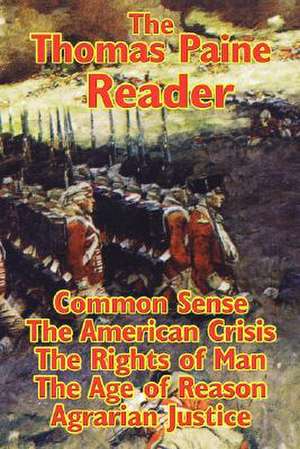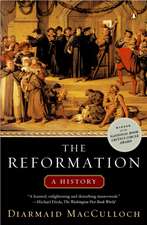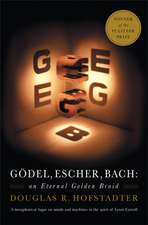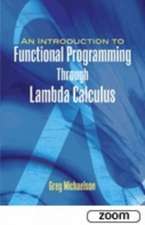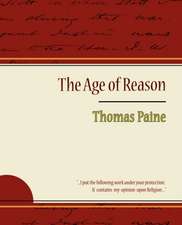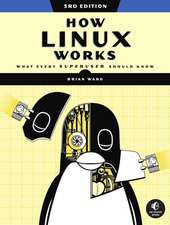The Thomas Paine Reader
Autor Thomas Paineen Limba Engleză Paperback – 13 noi 2007
| Toate formatele și edițiile | Preț | Express |
|---|---|---|
| Paperback (2) | 70.70 lei 22-33 zile | +27.42 lei 6-12 zile |
| Penguin Books – 29 iul 1987 | 70.70 lei 22-33 zile | +27.42 lei 6-12 zile |
| A & D Publishing – 13 noi 2007 | 177.18 lei 6-8 săpt. | |
| Hardback (1) | 217.48 lei 6-8 săpt. | |
| A & D Publishing – 13 noi 2007 | 217.48 lei 6-8 săpt. |
Preț: 177.18 lei
Nou
Puncte Express: 266
Preț estimativ în valută:
33.90€ • 36.98$ • 28.59£
33.90€ • 36.98$ • 28.59£
Carte tipărită la comandă
Livrare economică 24 aprilie-08 mai
Preluare comenzi: 021 569.72.76
Specificații
ISBN-13: 9781604591385
ISBN-10: 1604591382
Pagini: 536
Dimensiuni: 155 x 227 x 29 mm
Greutate: 0.7 kg
Editura: A & D Publishing
Locul publicării:United States
ISBN-10: 1604591382
Pagini: 536
Dimensiuni: 155 x 227 x 29 mm
Greutate: 0.7 kg
Editura: A & D Publishing
Locul publicării:United States
Notă biografică
Thomas Paine (born Thomas Pain[1]) (February 9, 1737 [O.S. January 29, 1736]- June 8, 1809) was an English-born American political activist, philosopher, political theorist, and revolutionary. He authored the two most influential pamphlets at the start of the American Revolution and inspired the patriots in 1776 to declare independence from Great Britain.[2] His ideas reflected Enlightenment-era ideals of transnational human rights.[3] Historian Saul K. Padover described him as "a corsetmaker by trade, a journalist by profession, and a propagandist by inclination".[4]
Born in Thetford in the English county of Norfolk, Paine migrated to the British American colonies in 1774 with the help of Benjamin Franklin, arriving just in time to participate in the American Revolution. Virtually every rebel read (or listened to a reading of) his powerful pamphlet Common Sense (1776), proportionally the all-time best-selling[5][6] American title, which catalysed the rebellious demand for independence from Great Britain. His The American Crisis (1776-1783) was a pro-revolutionary pamphlet series. Common Sense was so influential that John Adams said: "Without the pen of the author of Common Sense, the sword of Washington would have been raised in vain".[7] Paine lived in France for most of the 1790s, becoming deeply involved in the French Revolution. He wrote Rights of Man (1791), in part a defense of the French Revolution against its critics. His attacks on Anglo-Irish conservative writer Edmund Burke led to a trial and conviction in absentia in England in 1792 for the crime of seditious libel.
The British government of William Pitt the Younger, worried by the possibility that the French Revolution might spread to England, had begun suppressing works that espoused radical philosophies. Paine's work, which advocated the right of the people to overthrow their government, was duly targeted, with a writ for his arrest issued in early 1792. Paine fled to France in September where, despite not being able to speak French, he was quickly elected to the French National Convention. The Girondists regarded him as an ally. Consequently, the Montagnards, especially Maximilien Robespierre, regarded him as an enemy.
In December 1793, he was arrested and was taken to Luxembourg Prison in Paris. While in prison, he continued to work on The Age of Reason (1793-1794). James Monroe, a future President of the United States, used his diplomatic connections to get Paine released in November 1794. Paine became notorious because of his pamphlets. The Age of Reason, in which he advocated deism, promoted reason and free thought and argued against institutionalized religion in general and Christian doctrine in particular. He published the pamphlet Agrarian Justice (1797), discussing the origins of property and introduced the concept of a guaranteed minimum income through a one-time inheritance tax on landowners. In 1802, he returned to the U.S. When he died on June 8, 1809 only six people attended his funeral as he had been ostracized for his ridicule of Christianity
Cuprins
The Thomas Paine Reader - Edited by Michael Foot and Isaac Kramnick Editors' Introduction: The Life, Ideology and Legacy of Thomas Paine
Paine's Writings:
1. The Case of the Officers of Excise (1772)
2. African Slavery in American (1775)
3. Reflections on the Life and Death of Lord Clive (1775)
4. Liberty Tree (1775)5. Common Sense (1776)
6. The American Crisis (1776-83)
7. Public Good (1780)
8. Six Letters to Rhode Island (1782-3)
9. Letter to the Abbé Raynal (1782)
10. Dissertations on Government, the Affairs of the Bank, and Paper Money (1786)
11. The Rights of Man (1791-2)
12. Letter Addressed to the Addressers on the Late Proclamation (1792)
13. An Essay for the Use of New Republicans in Their Opposition to Monarchy (1792)
14. Reasons for Preserving the Life of Louis Capet (1793)
15. The Age of Reason, Part One (1794)
16. Dissertation on First Principles of Government (1795)
17. Agrarian Justice (1795)
18. Letter to George Washington (1795)
19. To the Citizens of the United States (1802-3)
20. The Construction of Iron Bridges (1803)
21. Constitutional Reform (1805)
Paine's Writings:
1. The Case of the Officers of Excise (1772)
2. African Slavery in American (1775)
3. Reflections on the Life and Death of Lord Clive (1775)
4. Liberty Tree (1775)5. Common Sense (1776)
6. The American Crisis (1776-83)
7. Public Good (1780)
8. Six Letters to Rhode Island (1782-3)
9. Letter to the Abbé Raynal (1782)
10. Dissertations on Government, the Affairs of the Bank, and Paper Money (1786)
11. The Rights of Man (1791-2)
12. Letter Addressed to the Addressers on the Late Proclamation (1792)
13. An Essay for the Use of New Republicans in Their Opposition to Monarchy (1792)
14. Reasons for Preserving the Life of Louis Capet (1793)
15. The Age of Reason, Part One (1794)
16. Dissertation on First Principles of Government (1795)
17. Agrarian Justice (1795)
18. Letter to George Washington (1795)
19. To the Citizens of the United States (1802-3)
20. The Construction of Iron Bridges (1803)
21. Constitutional Reform (1805)
Descriere
Descriere de la o altă ediție sau format:
Demonstrates the extent to which Thomas Paine was an inspiration to Americans in their struggle for independence. This book contains Paine's major works including "The Rights of Man", "Common Sense", and the first part of "The Age of Reason".
Demonstrates the extent to which Thomas Paine was an inspiration to Americans in their struggle for independence. This book contains Paine's major works including "The Rights of Man", "Common Sense", and the first part of "The Age of Reason".
